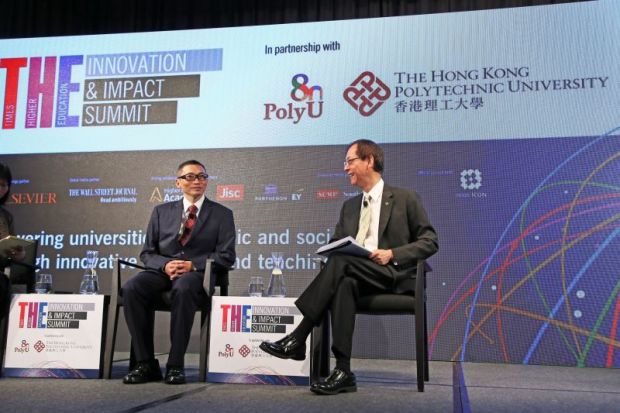Universities should see technology not as a threat but as a “golden opportunity” to reform global education systems, according to a leading Chinese philanthropist and entrepreneur.
Charles Chen Yidan, founder of investment company Tencent Holdings and the Yidan Prize, an education award, said that today’s teaching models were “developed to meet the needs of the industrial revolution” and are therefore “not suited to tomorrow’s society”.
Speaking at the Times Higher Education Innovation & Impact Summit at the Hong Kong Polytechnic University, Mr Chen said: “Today’s youth must be equipped for jobs that don’t even exist yet. As such, it is time for us to rethink who we are educating, how we are educating them, and why we are educating them the way we are. We need to rethink the outcomes we expect.”
He highlighted the impact dramatic technological changes will have on society, including automation replacing jobs. However, he said that technology will also “create jobs”.
“My view is that technology is not necessarily a threat. The big question is how to harness technology in education for good,” he said.
“Today, we have a golden opportunity not just to examine and develop our own education systems, but to gather and learn about best practices from around the world. This would have been virtually impossible just a few short decades ago due to the lag in information transfer capabilities. But technology has changed all of that and, with a few clicks of a button, the information is at our fingertips.”
Access all the coverage from the Innovation & Impact Summit 2017
In his keynote address on leveraging innovation for scalable changes in education, Mr Chen highlighted the growth of the city of Shenzhen, which he said has become “China’s Silicon Valley”. The city is home to many telecommunication giants and hi-tech manufacturing businesses including Tencent, which is the founder of free messaging app WeChat.
“Before smartphones became widely popular, Tencent already saw the potential and started developing a messaging app for mobile internet,“ he said. “This is the kind of foresight, innovation and ability to apply ideas in new frontiers that we need to see in the education sector, if we are to equip our children for the future.”
In the last few decades, due to technological advancement, the “right talent pool” and a community of investors the mode of operation in Shenzhen has shifted from “Made in China” to “Made by Chinese”, he added.
“Some might see it as a 'Cinderella' story but in fact the success factors have long been embedded – efficiency, flexibility, creativity and a culture that sparks innovation,” he said.
Mr Chen also spoke about how Wuhan College, which he founded in 2003, is harnessing technology to “enrich students’ campus experience”. It was the first non-profit private university in central China.
“Through what we call WeChat School, students don’t need to carry a heavy pack full of textbooks because everything is incorporated into WeChat. There’s an e-learning system that facilitates paperless teaching and learning. Students can borrow books from the library using QR codes. They can pay for lunch, apply for leave, and ask teachers questions, all through WeChat,” he said.
However, he added that it is “important to bear in mind” that innovation “is not confined to hardware such as technology” and that software such as education systems are “equally important”.
Last year, Mr Chen founded the Yidan Prize, which aims to reward innovation in education that is scalable. Starting this year, it will give out two annual awards, one for education research and one for education development.
Mr Chen said the goal of the prize is to “put the spotlight on the best and brightest the world has to offer in the hopes that the groundbreaking work being done by the few will become the resource of the many”.
“The Yidan Prize places high value on research work because it is often under-appreciated, but it is where boundaries are often broken,” he said.
“As they say, electricity was discovered but those who invented it didn’t know what to do with it in the first place. Ground-breaking research doesn’t always come to practical use for maybe 50 years.
“That’s why it’s important to keep an eye on the innovation with the highest potentials for growth and make it a source for many.”
Register to continue
Why register?
- Registration is free and only takes a moment
- Once registered, you can read 3 articles a month
- Sign up for our newsletter
Subscribe
Or subscribe for unlimited access to:
- Unlimited access to news, views, insights & reviews
- Digital editions
- Digital access to THE’s university and college rankings analysis
Already registered or a current subscriber?










